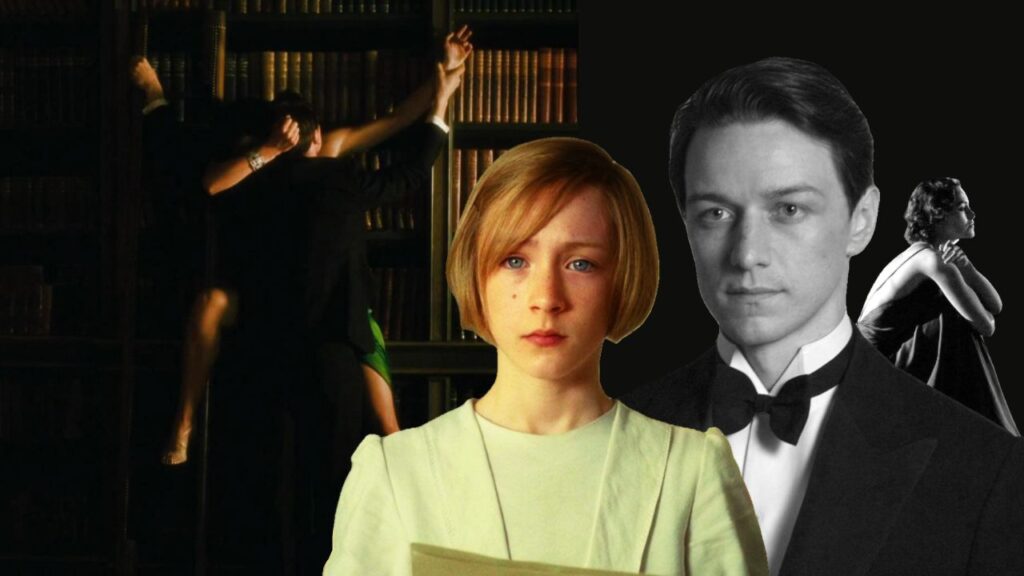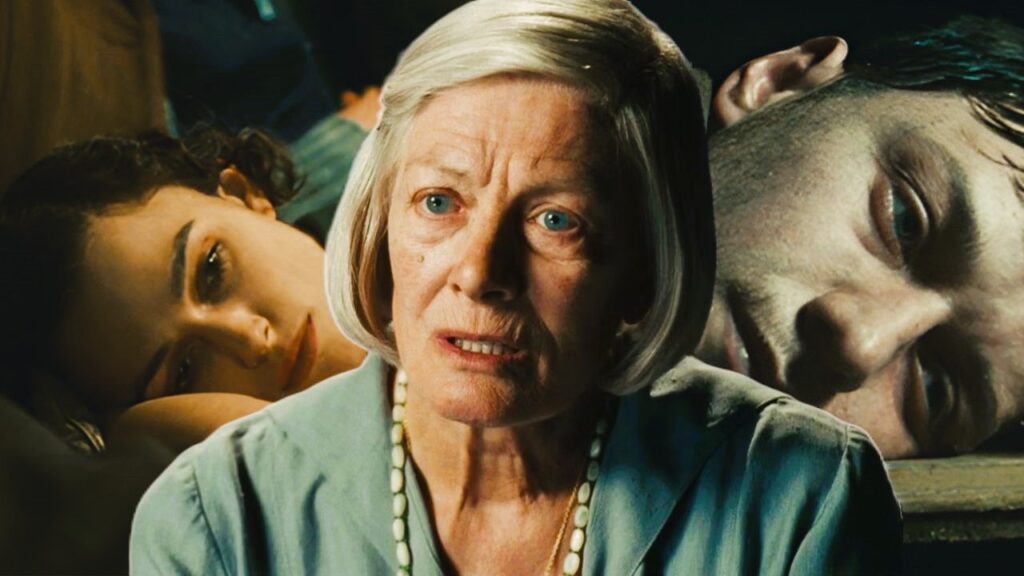This post includes a brief plot summary, an analysis, a review, and an explanation about the ending of the film Atonement (2007). Beware of spoilers.
Note: Directed by Joe Wright, the 2007 drama is based on Ian McEwan’s 2001 novel of the same name.
The film stars Keira Knightley as Cecilia Tallis and James McAvoy as Robbie Turner. The main character, Briony Tallis, is played by three different actresses (from young to old): Saoirse Ronan, Romola Garai and Vanessa Redgrave.
“Atonement” is a tragic tale about an unfortunate lie and its devastating consequences for the parties involved.
The story of “Atonement” takes place in three different time periods: 1935 (England), World War II and present-day England.
A wealthy family is about to host a gathering. The protagonist of this story is Briony Tallis, a young girl with big aspirations of becoming a writer. Her older sister is Cecilia Tallis, a young woman with romantic feelings for the housekeeper’s son, Robbie Turners. And from what it seems, it’s mutual.
During the gathering, something sinister happens: Briony’s cousin, Lola Quincey, is sexually assaulted. However, she doesn’t know who did it. And Briony immediately points her finger at Robbie, who is completely innocent. The accusation leads to Robbie’s arrest and imprisonment.
Four years pass by, and Robbie is out of prison. He got a shorter sentence by agreeing to join the army and fight the Battle of France (World War II). Meanwhile, both Tallis sisters have become nurses. And needless to say, the sisters are not keeping in touch with each other.
During the Battle of France, Robbie is ill from an infected open wound, but he still manages to arrive at the place of evacuation, the beaches of Dunkirk. Back in England, Briony finds out that Lola is marrying Paul Marshall, a family friend and a wealthy fella. However, during a flashback, Briony realizes that she made a terrible mistake, Paul is the one who assaulted Lola, not Robbie.
Briony rushes to Cecilia’s place to apologize for what she did. And to her surprise, Robbie is there too, and he is not happy to see her. Cecilia tells Briony to correct her testimony to clear Robbie’s name. The younger Tallis agrees to do so, but reminds Cecilia that Lola won’t be able to testify against her own husband.
A couple of decades later, Briony announces her retirement. She is now a well-known writer, and her latest and final novel is called “Atonement”. And here comes the big plot twist of the film “Atonement”: Briony’s encounter with Cecilia was completely fictional. It never happened. Briony was too afraid to reach out to her sister.
The ending of “Atonement” reveals Robbie and Cecilia never had the chance to see each other again. Briony wrote “Atonement” as “compensation” for taking Robbie and Cecilia’s happiness away. During the epilogue, Cecilia and Robbie happily reunite near the sea house they planned to visit once Robbie came back from the army.
Briony Tallis is an unreliable narrator, meaning that the entire story is told from her point of view.
Throughout the film, Briony shows signs of regret. However, we’ll never really know what went through that girl’s head when she accused Robbie of assaulting Lola. Briony’s actions could’ve been a combination of naivety and spite.
On the surface, one could say that Briony was naive and her cousin Lola influenced her to believe that Robbie was indeed a sex maniac. However, part of her hatred for Robbie also stemmed from rejection.
The turning point in Briony Tallis and Robbie Turner’s relationship was the lake incident. At the time, Briony was “crushing” on Robbie, and she staged a fake drowning scene at a lake to see if her crush was going to save her or not.
When Robbie found out about Briony’s “scheme”, he angrily scolded her, and rightfully so. Needless to say, Briony was upset by Robbie’s harsh words. Ever since then, Robbie has become “evil” in Briony’s eyes because the girl can’t handle rejection.
Briony’s interpretation of the events is indeed very childish because she failed to realize that Robbie genuinely cared for her. He was angry because the little girl made him worry for nothing. From that point on, Briony developed a bias towards Robbie.
Lola’s malicious words about Robbie, coupled with Briony’s skewed logic, were the lethal combination that led the latter to accuse Robbie of sexual assault.
At the time, Briony didn’t know that she was lying. The little girl really thought she was telling the truth and that her contempt for Robbie had a reason to be. Here is another instance that confirms Briony’s bias towards Robbie: Lola’s assault. Before her cousin was able to tell her who did it, Briony instantly assumed it was Robbie.
During a flashback, it becomes evident that Briony saw Paul Marshall assaulting Lola. Nonetheless, in her mind, she kept insisting it was Robbie Turner. That’s how deep Briony’s hatred goes for her former crush.
Lola Quincey might not be a real victim in “Atonement”, and her silence makes her as “guilty” as Briony Tallis.
So far, the audience has assumed that Lola Quincey is a victim of sexual assault because Briony Tallis “told” us that she is. However, what if she is not a victim? And if that’s the case, why did Lola lie?
There are two main arguments against Lola Quincey’s rape incident. First, her reaction when she saw Briony, right after her “rapist” fled the scene. Second, Paul Marshall’s reaction to it was also suspicious to say the least.
Let’s start with Lola. After Briony found her half naked, Lola kept asking her cousin whether she saw the perpetrator or not. Instead of feeling some sort of relief for having an eye witness to testify about the assault, Lola was completely distraught by the fact that Briony saw the man on top of her.
Now, it’s crazy to assume that Lola didn’t want the family to know who her rapist was, but maybe we are missing a little detail. What if it wasn’t rape? What if it was consensual sex? Although Briony screamed “rape”, what does she know? Not much, as this is the same girl who thought Robbie “attacked” her sister Cecilia earlier in the evening.
The second argument against Lola’s alleged “rape” would be Paul’s reaction to the whole incident. If Paul Marshall indeed sexually assaulted Lola, would he be that calm when the news broke out? Most likely not.
Lola Quincey and Paul Marshall put an innocent man in prison to safeguard their reputation in society.
Here is a plausible theory for what happened that night: Paul and Lola had consensual sex, but it’s 1935, so it would be a scandal if anyone found out about it. Therefore, they used Robbie Turner as a scapegoat to take the fall for their “indiscretion”.
This theory might explain why Lola decided to marry her “rapist”. In a way, they were both accomplices in what happened to Robbie Turner. Having said that, the marriage was sort of an arrangement to prevent Paul and Lola from testifying against each other.
What happened to Robbie Turner was a blatant case of classicism. If Robbie was the son of someone wealthy, would they still be able to pull that off? Probably not. But in this case, Robbie was the housekeeper’s son.
Both Lola Quincey and Paul Marshall are very flawed individuals, but the latter is undeniably worse. Paul Marshall is a “creep” who has no shame about going after underage girls. In hindsight, Paul was behind the marks on Lola’s body, the twins didn’t do it.
Three people destroyed Robbie Turner’s life: one told a lie, and the other two decided to omit the truth.
At this point, Paul Marshall and Lola Quincey are no less guilty than Briony Tallis. The two real victims in “Atonement” were definitely Robbie and Cecilia. Someone just robbed them of having a future together.
Although the World War II background theme is present throughout the film, “Atonement” is not about war. The story is a deep study about the terrible ramifications that certain actions can have. “Atonement” also highlights the irreversibility of certain decisions.
Briony used her whole life and existence to atone for that one terrible mistake she made at thirteen years old. However, is it even possible for her to compensate for the damage she has caused? Also, is she truly sorry for what she did?
“Atonement” concludes with a bittersweet and haunting ending.
The film ends with a sweet sight of Robbie Turner and Cecilia Tallis reuniting together, but it’s also incredibly heartbreaking because that’s not how their story ended. Robbie died of septicaemia while waiting for the evacuation in Dunkirk and Cecilia died a couple of months later during the bombing of Balham tube station.
Final Thoughts
“Atonement” is a film about complex emotions. Briony Tallis is a very interesting character to say the least, because one never knows what’s really going on in her head.
On the surface, Briony really seems to be sorry for what she did. However, there are also other moments when she slips and shows her true colours. For instance, the final interview. Even though the ending is about Cecilia and Robbie, Briony still manages to make it about herself by saying that she gave them their happiness back. It’s ironic, isn’t it?
The acting in “Atonement” was simply impeccable and engaging. Keira Knightly was captivating as the beautiful Cecilia Tallis. James Mcvoy gave a really strong performance as the housekeeper’s son, Robbie Turner. Saoirse Ronan was great as Briony Tallis. She played her with ambiguous undertones, which only goes to show the great actress that she already was back then.
Overall, “Atonement” is a beautiful film. The contrast between the two narratives (fiction and reality) is the element that makes “Atonement” such an unforgettable film. Needless to say, the music was sublime and really elevated “Atonement” to another level.





